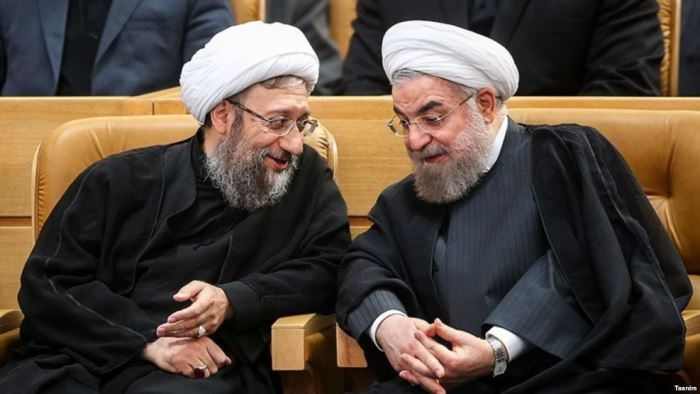Controversy Over Transparency Turns into Security Blame Game between Gov’t Branches

Lost amid commotion over the death of revolutionary figure Akbar Hashemi Rafsanjani and the deadly collapse of Plasco Building in central Tehran was another altercation between heads of the executive and the judiciary.
It started when Rouhani administration criticized issuance of execution verdict for Iranian tycoon Babak Zanjani over his convictions of economic corruption, saying the death penalty did not address the main challenge in the case, i.e. settlement of his debts to the Petroleum Ministry. On January 3rd, President Hassan Rouhani brought up the issue once again, saying the Judiciary should have given the custody of Babak Zanjani to the Intelligence Ministry.
The next day, Chief Magistrate Ayatollah Sadegh Amoli Larijani fired back saying Babak Zanjani had claimed during his interrogations that he funded billions into Hassan Rouhani’s presidential campaign in 2013. He went on to blame the foreign ministry for its laxity and failure to track and take back Zanjani’s assets in foreign countries.
In response, administration officials responded by saying they were ready to publish Rouhani’s campaign funds if other candidates would do so. Rouhani’s oil, intelligence, and foreign ministries issued separate statements providing details of their cooperation with the judiciary.
Chief Magistrate Sadegh Larijani also accused the presidential bureau of having installed (anti-)surveillance equipment without informing security and intelligence authorities and demanded that the administration provide explanations on the permissions obtained and the budget spent on the equipment.
The open confrontation of the two branches of government soon turned into an unsolicited race in media to publish updates. Ultraconservative news agency, Mashregh, has implied a link between the equipment and the Interior Ministry’s ‘insistence’ to move toward electronic voting. The ministry says over 200 million ballot papers should be printed for the three-legged elections, to be held May 19, 2017.
Uncorroborated reports continued to appear on Principlist media outlets throughout the week. A number of Principlist members of the parliament also provided commentary.
Javad Karimi Ghoddousi, hardliner MP and member of the parliament’s national security committee told Basij News that he possessed documents that demonstrated implication of Akbar Hashmi Rafsanjani’s son, Mehdi, who is now in prison over security and corruption charges.
“Mehdi Hashemi imported telecommunication and jamming devices via British [intelligence] service to disrupt state TV and radio channels during the 2009 sedition, which was installed in several institutions and even disrupted the nation-wide Channel 1 of state TV for five minutes,” Raja News quoted Ghoddousi as saying. Ghoddousi has also vowed to submit an enquiry to the Intelligence Minister on the telecommunication and security equipment installed in the bureau.
Accusing the administration of a plot to bipolarize the country on the threshold of the election, he said a group is planning to add fuel to the fire to repeat “anti-security incidents” of the 2009 sedition, a reference to post-election rallies against presumed fraud in presidential poll, which carried on for months. Rouhani’s Deputy Chief of Staff Morteza Bank denied the allegation, stressing that the equipment had been installed in coordination with the Intelligence Ministry and the intelligence arm of the Islamic Revolutionary Guard Corps (IRGC).
In the meantime, Hossein Naghavi-Hosseini, Principlist spokesman of the parliament’s national security committee also told Basij News that the equipment were used for wiretapping, anti-surveillance, jamming, and measures of the kind. Like Ghoddousi, he implied a sedition scenario, saying the soft, i.e. political, aspects of the 2009 sedition has been thoroughly discussed in public while the hard, i.e., technical aspects still need elaborations for the public.
Both sides eased their tone, however, following calls from Supreme Leader Ayatollah Khamenei for ‘fraternity’ between officials. The blessing in disguise so far has been more publicity on what the sides of the battle have done in their investigation of economic corruption. As Mohseni Eje’ei of the Judiciary and Rouhani’s advisor Hessamoddin Ashena have noted, the administration accountable for the tycoon’s case is Ahmadinejad’s and it is now turn for the Ahmadinejad officials to provide clarification on what they did.

